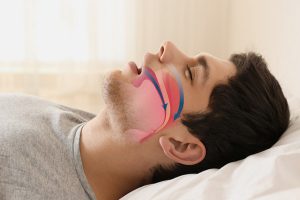Wow, great experience having my wisdom teeth removed which I never thought I’d ever say. Clinic was very organized, all the staff I dealt with was very friendly and helpful, and the extraction and aftercare was excellent. I’d get my teeth removed there again if I could! Very happy!
General Information
 People with obstructive sleep apnea (OSA) have disrupted sleep and low blood oxygen levels. When obstructive sleep apnea occurs, the tongue is sucked against the back of the throat. This blocks the upper airway and airflow stops. When the oxygen level in the brain becomes low enough, the sleeper partially awakens, the obstruction in the throat clears, and the flow of air starts again, usually with a loud gasp.
People with obstructive sleep apnea (OSA) have disrupted sleep and low blood oxygen levels. When obstructive sleep apnea occurs, the tongue is sucked against the back of the throat. This blocks the upper airway and airflow stops. When the oxygen level in the brain becomes low enough, the sleeper partially awakens, the obstruction in the throat clears, and the flow of air starts again, usually with a loud gasp.
Repeated cycles of decreased oxygenation lead to very serious cardiovascular problems. Additionally, these individuals suffer from excessive daytime sleepiness, depression, and loss of concentration.
Some patients have obstructions that are less severe called Upper Airway Resistance Syndrome (UARS). In either case, the individuals suffer many of the same symptoms.
The first step in treatment resides in recognition of the symptoms and seeking appropriate consultation. Our doctors offer consultation and treatment options for Obstructive Sleep Apnea.
In addition to a detailed history, the doctors will assess the anatomic relationships in the maxillofacial region. With a cone beam CT analysis, the doctors can ascertain the level of obstruction. Sometimes another specialist does a naso-pharyngeal exam with a flexible fiber-optic camera.
To confirm the amount of cardiovascular compromise and decreased oxygenation levels, a sleep study may be recommended to monitor an individual overnight.
There are several treatment options available. An initial treatment may consist of using a nasal CPAP machine that delivers pressurized oxygen through a nasal mask to limit obstruction at night.
In more complex cases, the bones of the upper and lower jaw may be repositioned to increase the size of the airway (orthognathic surgery). This procedure is done in the hospital under general anesthesia and requires a one to two day overnight stay in the hospital.
OSA is a very serious condition that needs careful attention and treatment.
